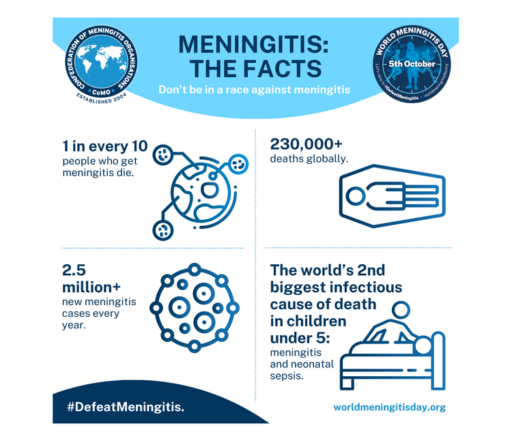Catherine Adamec, Trainee Solicitor in the Court of Protection team marks World Meningitis Day, which took place last week on 5th of October 2023 in this blog.
It is a day where millions of people all over the world came together to raise awareness of the disease and the global road map to defeat meningitis by 2030.
Meningitis is an infection of the protective membranes that surround the brain and spinal cord. It can affect anyone, but is most common in babies, young children, teenagers and young adults.
If meningitis is treated quickly, most people will make a full recovery. However, if not promptly diagnosed and treated, meningitis can be very serious and can in some cases lead to brain injuries.
It is therefore crucial to recognise the signs of meningitis and seek immediate medical attention to reduce the risk of complications and potential brain injuries.
In some very unfortunate cases, meningitis cases can involve claims of clinical negligence. These situations can occur if there has been; a misdiagnosis or delayed diagnosis, inadequate treatment, failure to recognise symptoms, improper follow up care and/or medication errors.
Take the case of P. P was aged 15 months and started to display signs and symptoms of a serious bacterial infection. She was found to be floppy with a vacant stare and had a temperature of 40.1. Concerned by the examination, P’s GP suspected meningitis and sent her to hospital in an ambulance after giving her penicillin. However, doctors at the hospital did not take sufficient notice of the GPs concerns and instead diagnosed tonsillitis. Her meningitis was therefore left partially treated. She subsequently developed hemiplegic cerebral palsy and has severe and complex needs.
It was found that the doctor who treated P had fallen into a “trap”, because he had not appreciated that the antibiotics administered by the GP had been masking P’s symptoms and that a truer picture had been presented during P’s initial visit to the GP.
This case was the first High Court judgement in a meningitis case in over three years, however the Meningitis Research Foundation revealed that misdiagnosis might not be as infrequent as we would hope, where:
- 30% of young babies with bacterial meningitis receive inappropriate early treatment.
- 49% of children with meningococcal infection are sent home after their first GP visit and not admitted to hospital.
World Meningitis Day and Meningitis Research Foundation are fighting to highlight the need to raise awareness of meningitis, its signs and symptoms, vaccines that are available. It is an infection that needs global attention and effort to be defeated.
New surveys following the recent World Meningitis Day showed that one in three people were unaware of what lifelong disabilities can arise from being diagnosed with meningitis. This demonstrates that there is still a pressing need to raise awareness of the disease and its complications.
The World Health Organization’s Global Road Map to Defeat Meningitis by 2030 aims to improve prevention, diagnosis and treatment, disease monitoring, health advocacy, and support and aftercare, saving up to 200,000 lives annually and significantly reducing disabilities caused by meningitis.
Countries worldwide have committed to the vision of better prevention, diagnosis, treatment, disease monitoring, health advocacy, and support and aftercare.
As a trainee solicitor in the Court of Protection department I have sadly become very aware of the extensive and lifelong cognitive and physical difficulties that can arise from meningitis.
It is of course correct that no amount of funds can change the significant impact that such difficulties will have for a person and their family, however, where there has been negligence, and a litigation claim can be pursued on their behalf, the resulting funds can help to provide for expert care, therapeutic input and accommodation to allow the injured person to achieve the best possible quality of life.
In the Court of Protection Department at Hugh James we currently act as professional property and financial affairs deputy for almost 300 people, some of whom have acquired brain injuries because of diseases such as meningitis. We work closely with these clients and their families to ensure that funds arising from litigation proceedings are managed carefully, and utilised in accordance with their best interests.




